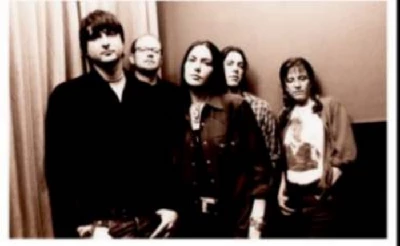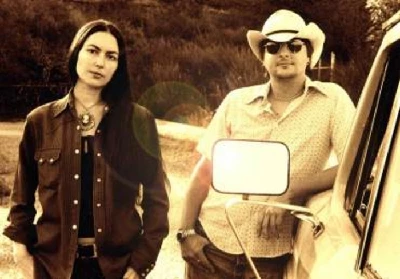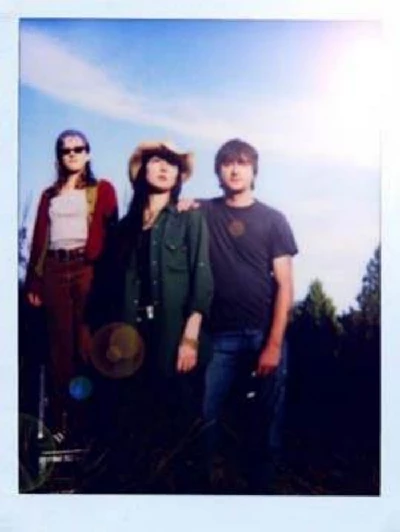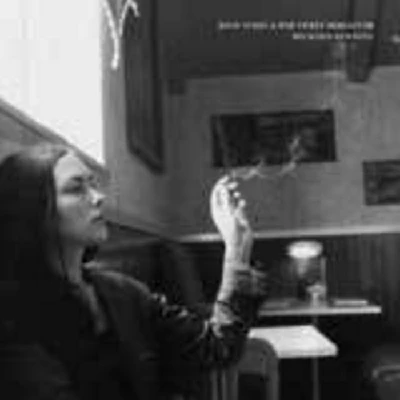Miscellaneous
-
Interview
published: 16 /
1 /
2003

One of the rising stars of alt.country , Jesse Sykes' new band the Sweet Hereafter was born out of a troubled past, and features former Whiskeytown guitarist Phil Wandscher. John Clarkson speaks to her about its debut album, 'Reckless Burning'
Article
The late 90’s were bittersweet years for both rising alt.country star, Jesse Sykes, and her guitarist, Phil Wandscher.
The New York born, but now Seattle-based Sykes met with moderate success when her then band Hominy released its debut album, ‘Ivy’, in early 1998. Even before the record came out though, the group and her marriage to the band’s guitarist, Jim Sykes, had, however, started to disintegrate.
Wandscheder had been a member of the much acclaimed Whiskeytown and co-wrote much of the band’s breakthrough second album, ‘Stranger’s Almanac’ (1997), with the group’s frontman, the now successful solo artist Ryan Adams. He and the notoriously prickly Adams, however, had a temperamental relationship, and shortly after the release of 'Stranger’s Almanac’, Wandscheder quit Whiskeytown in disgust, emotionally and physically exhausted.
He moved from North Carolina to Seattle in 1998, and met the now divorced Sykes in a local bar after watching one of Hominy’s final shows at the tail end of that year. They began dating each other shortly afterwards, and eventually, moving in together, started writing songs together.
The pair initially performed together as a duo with Wandscheder on electric guitar, and Sykes on acoustic guitar and vocals, before augmenting into a trio by adding on violin a few months later Anne Marie Ruljancich, who had worked with the Walkabouts and who also now plays with the Transmissionary Six. The group, which took the name the Sweet Hereafter, was later further expanded when upright bass player, Bill Herzog, who plays regularly with Neko Case, and drummer Kevin Warner, who also is a member of a local alt. country act Evangeline, joined the line-up.
The Sweet Hereafter’s debut abum, ‘Reckless Burning’, which was produced and recorded by the prolific Seattle producer Tucker Martine at his Mount Analog studio was released last March in America on Burn Burn Records, and in Europe on the French label Fargo in October.
Evocative and precise, and in part inspired by Sykes and Wandscheder’s own intense love affair, and in part by the emotional burn-out of their previous relationships, ‘Reckless Burning’ has been self-described by the band in its press release as evoking “ a darkly romantic, country-noir style that tell tales of dislocation, reconcilation, folk wisdom and mystery.” Combining Sykes’ alto vocals and thoughtful acoustic guitar with Wandscheder’s terse, sparse electric guitar work and the rest of the group’s taut instrumentation, it has drawn the band favourable comparisions with Emmylou Harris, Will Oldham, the Cowboy Junkies, Low and Mojave 3, and was seen by many critics to be one of the best alt. country albums of last year.
The group have played shows on the West Coast of America with the likes of Steve Earle, Howe Gelb, Mark Lanegan, Neko Case, the Handsome Family and Richard Buckner. The original duo of Sykes and Wandscheder have now lined up a 30 date tour of Europe for late January and throughout February, which will take in shows in Britain, Holland, France and Norway,
Pennyblackmusic spoke to Jesse Sykes in late December about both ‘Reckless Burning’ and the tour, but began by asking her about the group’s unusual name.
PB : Why did you decide to call the band the Sweet Hereafter ?
JS : The main reason was because of this dream that I had. It was a once in a life time dream, which had a strong impact on me.
The dream oddly enough happened the night before we we were due to start recording the album. I had been feeling pretty nervous about the whole process, because there had been a long build-up to it and we had had to book the time months in advance.
It was a flying dream, and I felt in it a joy in which I have never really experienced as an adult, and probably haven’t ever experienced since I was a little kid . In the dream, this navigator was flying me. We went over cities and towns and at one point we flew over a graveyard .
There was nothing macabre about the graveyard. It was really beautiful. There were pine trees and the moon was shining on the marble of the tombstones. We started flying down over the graves, and, as we approached them, I heard this beautiful violin music. When we got right over them, it got a little louder and then it kept disappearing. The narrator asked “Do you know what you’re hearing ?”I didn’t know, and then he told me “That’s the sound of people’s souls. That’s what souls sound like. You’re hearing dead peoples’ souls” After that we went on. At another point in the dream the angels were blowing horns. The music was like nothing I had ever heard in my waking life. It was the most incrediblly stunning dream, and it’s been with me with ever since.
I told Tucker the next morning about it and he told me to focus on the dream while I was doing my vocals as it was so amazing, and so I did. Months later when it became time to name the band I was really struggling to choose a name for it, and was getting quite anxious about it. It then occured to me to call the band the Sweet Hereafter To me, the Sweet Hereafter means a state of grace, and I think in that dream I was in a state of grace.Phil and I talk about this a lot, but we want this band to be a safe, beautiful place after some of the other experiences that we have been in. It all began to make sense after that. It seemed then that naming the group the Sweet Hereafter was a gift that I had been lead to.
PB : When you formed the Sweet Hereafter, Hominy, which had featured your ex-husband, had broken up. Phil had also left Whiskeytown in equally traumatic circumstances. Did you form the Sweet Hereafter just simply because you needed to have some fun ?
JS : I don’t really think that that was the reason. Initially, when we first got together, neither of us did any songwriting at all. We never really made a conscious decision to start working together. It was just something that eventually happened.
There would be days, as our relationship was progressing, that we would be out having fun, and I would sometimes think “Why am I not writing songs any more, especially those about my life going nowhere ?” I just wasn’t bothered though , and I don’t think that Phil was either. Then occasionally the realisation I wasn’t done with songwriting would start nipping at my heels again. The songs started coming back, and the need to have a creative outlet began to rear its ugly head again
PB : As you also live together, and because of your past experiences, did you feel nervous about forming a band with one another ?
JS : It has happened to me a couple of times before. I always tell people not to worry about it. Bands break up whether you’re intimate with someone or not.
I think that it actually makes things a little easier in some ways. There’s a level of trust and initimacy that you wouldn’t otherwise have. The bottom line of it all is that you don’t have to walk on eggshells with someone that you’re sleeping with. It can sometimes be hard to communicate with someone what you want from them both musically and emotionally. I love the fact that I don’t have to worry about that. Everything came more naturally simply because we were already living together.
PB : The group was initally formed as a duo with just you and Phil, but now it also features Anne-Marie Rulijnach on the violin and cello,Bill Herzog on the bass, and Kevin Warner on drums. At what point did they join the band ?
JS : Anne Marie started working with us before we made the record. At first there was me and Phil, and then Anne Marie came on board, and we played as a three piece for about six months or so. We felt that the sound needed fleshing out a little more for the album, so I gave Bill and Kevin, who we already knew, a call, and asked if they would be interested in playing on the record. They said that they would, and since then everything has continued to luck out. Everyone’s made more of a commitment to the group. It has been a long slow progress, and it has taken us some time to be a band.
PB : Did you have any expectations of what you wanted the record to sound like when you went in to record it ?
JS When Phil and I write together, I tend to write the bare guts of the songs, and the vocal melodies, and then Phil adds to them a guitar melody, which is equally important. His guitar and my voice and the way in which I write are all very unified. We fit together as characters well. When we went in to make the album, I wanted to get that down on record.
Beyond that I don’t really think we were looking for anything We knew that we had something special, and got lucky really. I would have been happy just to demo the stuff we had. When we went into the studio, I really didn’t have grandiose expectations.
PB :When did you realise that you had made a great album ? There must have been a point in which you realised that you had made a fantastic record.
JS : Thank you, that’s kind of you. The night that we finished though and had the final version in our hands to go home with, Phil went and got a burger while I sat in the car, and I remember thinking that I should kill myself because I had just made something which I thought was totally awful . I was thinking that at that point that I should go and find the nearest bridge and jump off. At that juncture I thought that I had just wasted a nice chunk of change and a lot of time and had just made an absolute piece of crap.
That’s what comes from being too long in the studio. There were moments , glimmers when I thought “Wow, this is pretty stunning” but there were other moments when I was completely out of my head. Music doesn’t even seem like music after you have been in a studio for a long time. There is no linear. When you’re stuck in a room like that for long periods, your brain starts interpreting and listening to things at a completely different level.
When we came home later that night, we put on the album and I kept saying to Phil “No, you don’t understand. I’m not ready to hear it yet” , but slowly, like a de-icing process. I started to hear it as music again, not as my whole life experience, and two years of saving money.
PB : How did Phil feel about it ? Was he happy with it from the beginning ?
JS : He was really happy with it from the beginning. He thought it was pretty cool. It’s always a big test on your own home stereo. He was pretty stoked.
We’ve done a few tests since then. It’s been a while since I heard it now. The last time was a few months ago, but before then we did a whole series of month later listening tests and I am really pleased with it now as well.
We’re now working on the next one. Right now we have got lots of energy and are really excited because we will be going back into the recording studio soon.
PB : W hen will the next album come out ?
JS : We’re shooting for September. When we get back from Europe, we’re going to go back into the studio at the end of February and we will probably record through until April, not straight, but a week here, a week there. That kind of thing. Our record company over here wants to put out the record in the early Fall, which sounds like a long time, but for us it’s not long enough really.
PB : ‘Reckless Burning’ has described by you as “being about being in love, but also about being completely over your head’. What did you mean by that ?
JS : I don’t want to say this happens every time, but to me the irony of being in love is that it is the most beautiful, but also the most terrifying thing in the world.You have to face the threat at one level of losing yourself. When Phil and I fell in love there was part of me that, having just been through the divorce, didn’t care.I was ready to just get lost.
We look back now on the first three years of our relationship and, as a joke, we call them 'The Reckless Years'. Every one has their own little personal movie, and the title song and the whole concept of the album was inspired by that time.
We used to go on these drives and camping trips out into the wilderness . Some of the trips we would go on would get a little spooky.W e were on the way home from one camping trip, and we got stuck on this scarey little logging road in a flood and torrential rain. I remember being terrified as I thought the car we were in might get washed away into the river , but at the same time I was also thinking “I’ll take whatever comes. I’m in love. if I die, I’ll die happy with this person.”
The title song is about that and it is autobiographical. I turned it into a city setting instead of being out in the wilderness, but the characters in that song are in over their heads, but also in the same way completely resigned to whatever is thrown at them
If you can depict falling in love, in the sort of way that the Sweet Hereafter dream was, then maybe very possibly, like the characters in 'Reckless Burning’ you would be driving in the darkness and an old song like ‘Goodnight Irene’ would be on the radio. Like them also you might be watching your city burn down, but at the same though you would also be so enclosed in your own little reality that you just wouldn't care about any of that.
It’s a cliche to say “Oh, falling in love is scary”. It’s the reason why everyone is crazy on this planet. Trying to visualise what that feeling is like though is what I always go for for with my songwriting. We are trying to evoke in a more pastoral and a less direct way what those feelings feel like visually if you were to close your eyes and to dream them.
PB : The album makes a very strong use of the outdoor elements . The sun, water and and the sky all get referred to in the lyrics quite a lot. Did you write a lot of the songs when you were on those camping trips ?
JS : We did. Yes ! Major portions of the album were written when we were out in the wilderness. Phil would be off fishing, and I would sit around and play guitar and compose songs all day in these amazing spaces. Even if they were written back in our apartment, a lot of the songs evolved from that experience. We spent so much time going camping the woods were like my new home for a while. The empty space really helped me to get a lot of clarification. If you're sitting by the river, it's the best way to cleanse your mind against that constant drone of city noise. Things come just to you. It sounds hippy, but it is so true
PB : You're about to tour Europe, having largely stuck to the West Coast and to playing cities like Portland, Seattle, San Francisco and Berkeley. Who will be going out on the tour ? Will it be just you and Phil ?
JS : Yeah ! It's just the two of us.
PB : What can European audiences expect from these shows ?
JS : It’s funny. It used to scare the Hell out of me playing as a duo. We started out that way, but then I started to get really attached to the instrumentation with Anne Marie, and then again when the rhythm section joined .
Recently though we did a show up in Birmingham with just the two of us. I had so much fun and realised then that these songs absolutely work in any form. They can be conveyed in any way. The more stripped down they are the more true they are to their roots in some ways
That's the beauty of how we made the full record. We intended it to just be us at the beginning, and then other people slowly got on board, and I remember every time we'd add something to it, I kept asking myself if we were going to squash it. Of course, as time went on, I fell in love with everything we added.
Now though, because it is so costly to tour Europe, we are going back to square one.There is definitely a spacious quality to our gigs, and I think we have a really really strong harmony.
We did another show in Seattle as a duo. People were really responsive, and that kind of boosted my confidence We’re going to be playing over 30 shows in Europe so we should be able to get our chops down real good. Phil plays the electric guitar even when we are playing as duo There are going to be a lot of new songs that we are going to play that aren't on the record, and I think, therefore, that we should be able to pull it off and am really excited about it.
PB : Thank you very much
Picture Gallery:-


